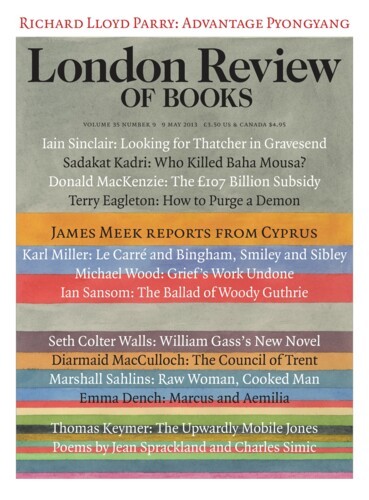I
Borneo, 1951. Deep in the interior,
on the deep jungle floor, a young missionary is kneeling
not in prayer, but in the equally experimental service
of edging a spatula into the earth
and collecting a few rich crumbs for the vial.
He has gone, as the letter said he should,
far from the beaten track. He has left the village
and walked for four hours to this small clearing
where the forest steams and swells around him
with the cries of mynah and hornbill, gibbon, cicada.
Sweat prickles his neck as he seals the vial.
A horned beetle, polished like a sideboard,
runs over his gloved hand. He’s no scientist
but he knows the words of Ecclesiastes:
The Lord hath created medicines out of the earth;
and he that is wise will not abhor them.
In the lab back home in Indiana,
his friend the chemist will analyse
these gentle scrapings of soil and spoor,
isolate a new microbe, and name it 08565.
II
The lead-grey lift continues past our floor,
up to the very top, out of bounds to the public,
and in steps a man in a high-vis jacket
with a hawk standing on his gloved hand. A hawk
with bronze shoulders and hooked beak.
Twice a week they fly her at dusk, he tells me,
when the city’s pigeons commute here for roosts.
She is at heart a huntress, but trained
in the ways of deterrence. Still, says her man
with pride, she does sometimes kill.
Into the airless lift where I stand like a dead thing,
she brings the scent of November, her feathers still damp
with the floodlit air where she circled just now
over the flat roofs, the chimneys and vents,
the maintenance routes and air ambulance landing pad:
all the great sprawling body of the hospital.
Into this shut-up place she comes heraldic,
in her wings the memory of thrust and soar,
of the sudden stoop and the canceleer
before he called her back to the glove to feed.
And I look and look into her unreadable eyes,
stung by a fierceness and freshness I thought was lost.
III
Two floors down, in a room as deep
and remote as the deep jungle clearing,
a new front has opened in the long microbial war
and that front is my mother.
On one side, bilateral pneumonia.
The old man’s friend. The coup de grâce.
On the other, the antibiotic drip
delivering its metered dose of 08565:
the wonder drug, the drug of last resort.
Into the shut-up place of the body it comes
bringing the distant memory of soil and spoor:
Vancomycin. It has saved many lives
but here, in the battlefield of my mother’s body,
infection blooms and swells
and will not be vanquished. I sit and look
into her unreadable eyes. Pegged to her finger
a small barometer shows the chances:
low, and falling. Even so
when this is over, a day or two from now,
and I’m counting through my hoard of petty regrets,
I’ll wish I’d told her about the missionary.
A good man. Nothing in it for him –
just the walk and the heat, the letter in his pocket
and the restless, living earth where he knelt.
IV
A thin blue curtain divides the world in two:
the dying from the living. On this low-lit side,
her breathing has become the measure of everything;
all human experience slips through the funnel of this sound.
All her days she has been open to breath,
but is closing now against its simple gifts.
Her lungs are drenched flat as the wings of the butterfly
I tried to rescue from the pool in summer.
On the other side of the curtain, the brilliant
clatter of instruments on a trolley, the slam
of a metal drawer on the nurses’ station,
voices, a burst of laughter.
Who would have thought death could be present here,
in the same room as life? I mistook them for opposites.
She takes small sips of air as if it were unfamiliar
and she not sure she’ll like it. Should I
pull the curtain aside and call out
this air doesn’t work, can they bring her another kind?
Send Letters To:
The Editor
London Review of Books,
28 Little Russell Street
London, WC1A 2HN
letters@lrb.co.uk
Please include name, address, and a telephone number.

